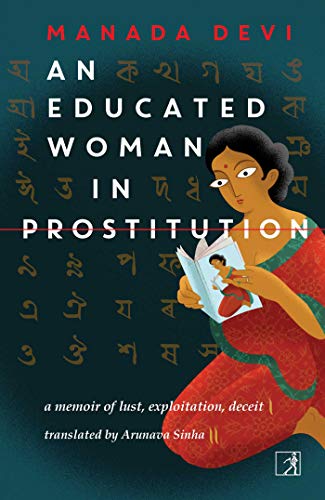Author: Manada Devi
Translated by: Arunava Sinha
Publisher: Simon & Schuster India
Genre: Fiction, Translation
Book summary:
‘But now, having travelled to the frontier of the world of sins, I no longer hesitated in trampling over the remnants of the goodness in my heart.’
Manada, Maani didi, Feroza Bibi, Miss Mukherjee – the jostling identities of our beguiling and charming protagonist as she glides through a life that can be seen as exploitative yet, also, curiously, empowering and honest. Manada’s fascinating life story takes her from her wealthy cossetted upbringing to a life of debauchery and prostitution after she elopes with her married lover when in her mid-teens. She is capable, attractive and doesn’t ask for pity as she struggles with illness, poverty and abandonment, but ensures that she emerges relatively unscathed and carves a niche for herself in her profession.
Manada matures and settles into a life of prostitution, entertains barristers, doctors and other men of high society. She describes her colourful life with relish but is often introspective as she places her own position as a sex worker in the context of the times, calling out young sanctimonious patriotic men who maintain a high standing in society yet secretly fancy prostitutes. Rather tantalisingly she takes no names, only occasionally hinting at their identities, to avoid scandals and protect the double lives of men who are well-known in Calcutta in the 1920s. Weaving together multiple strands, looking beyond ideas of morality and accusations, we are presented a life of immense beauty and endurance, which is both grand in its scope and deeply intimate in its portrait.
About the Author:
Manada Devi is considered the pen name for the author. Opinion differs whether an actual woman has written this book.
About the Translator:
Arunava Sinha is Associate Professor of Creative Writing at Ashoka University. He is a prolific translator, winning a host of literary awards for his translations. Over 60 of his translations have been published in India and several in abroad.
My Review:
First published in 1929, An Educated Woman In Prostitution: A Memoir of Lust, Exploitation, Deceit by Manada Devi and translated by Arunava Sinha is a book that defies genres, style and even intent. That the book sold out its’ first editions when it was published in Calcutta to much public scrutiny is no surprise given the manner in which the supposed author, a woman belonging to a well to do upper caste and class family falls into prostitution and then writes to tell all about the higher echelons of society who come to her in the dead of night while spouting idealism during day time.
The catch? While the book gives a true reflection of Calcutta in terms of the socio political backdrop of the time it is set in, while it touches on the winds of change blowing through the elitist society, it is well possible that the author did not exist but is actually a composite of many real women who took on prostitution because of the circumstances that pushed them into it. It’s no Fanny Hill for there is little that is steamy or scandalous in terms of intimate details about the world of prostitution. Rather, it is more of intellect and philosophical wisdom that drives the narration and a very telling commentary on the real socio politics of Calcutta behind the overall liberal and progressive outlook it was being known for and taken great pride in.
The time frame that this book is set in is crucial to understand the import of the writing and what it has to say. Calcutta in the early 20s was in the throes of nationalist and social reformation: the youth had idealistic heroes who took up the calls of the Brahmo Samaj and called for liberation from social shackles, it was the time when the arts opened up to educated women and when reformist leaders took it upon themselves to ‘cleanse society’ by dispensing lessons on equality. It has a few critical questions: some are direct while a few lie hidden out of plain sight. It questions unerringly why men of high positions who go to prostitutes continue to be held in high esteem by society while the women themselves are treated as the most low of life. The writer puts the spotlight on social hypocrisy by asking who pays the price when ideals are lofty and the flesh weak. This is a book that needs to make its way to discourses on gender and feminist studies in the country.












